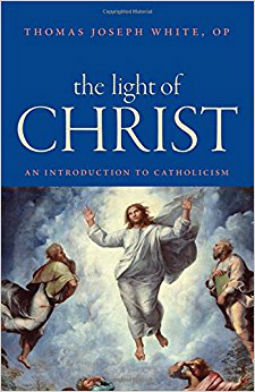‘The Light of Christ’ Pierces the Darkness of Emotionalism
BOOK PICK: Dominican Father Joseph White’s important new book reintroduces the faith to a skeptical culture.

THE LIGHT OF CHRIST
An Introduction to Catholicism
By Thomas Joseph White, OP
The Catholic University of America Press, 2017
328 pages, $19.95
To order: amazon.com
“It is funny how mortals always picture us as putting things into their minds; in reality, our best work is done by keeping things out.” So observes the eponymous demon in C.S. Lewis’ The Screwtape Letters.
It is indeed an effective tactic: not so much to make us think bad thoughts as to keep us from any thoughts. Old Scratch knows that disciplined, honest thought is not his ally. He must delight, then, in our emotive, sentimental, distracted culture.
We seem to be perfect “patients,” only too happy to have things kept out of our minds. Much of our technology and social media seem designed for that purpose. Our most important political and cultural conversations are quickly reduced to emotions and feelings — conducted by way of sound bites, pat phrases and 140 characters.
This superficiality haunts the Church, as well. It creeps in and tempts us to reduce matters of faith and doctrine to mere experience and feeling. And when we yield to the culture, then emotion trumps the intellect, experience overrules theology and therapy replaces conversion of heart. Of course, Catholicism languishes in such shallow soil. The Church always seeks to sink her faith and life into the deep soil of thought and intellectual engagement.
Into the midst of this anti-intellectual culture comes Dominican Father Thomas Joseph White’s latest book, The Light of Christ: An Introduction to Catholicism. It is aptly named: Father White shines the light of serious teaching and reflection into the darkness of emotionalism.
Some have already compared the book to then-Father Joseph Ratzinger’s 1968 Introduction to Christianity. The comparison is fair, to an extent. Both works seek to reintroduce the faith to a skeptical culture. But, with all due respect to Father Ratzinger, the average reader will find The Light of Christ more accessible.
Still, the word Introduction might mislead some people. The book is indeed an introduction. But that does not mean it is simplistic or effortless reading. Perhaps we do better to consider the book an introduction not just to Catholic teaching, but to Catholic thinking — a how-to on Catholic thought.
The book is more than a catechism and more than an apologetics manual. Father White conveys not just what the Church believes, nor only why she believes, but also — and more importantly, in our culture — how she thinks about these things. The Light of Christ cultivates in the reader not just knowledge, but a habit of thought.

Father White teaches at the Dominican House of Studies in Washington, D.C. He also runs The Thomistic Institute, a great organization that seeks to engage the culture in serious conversations and bring Catholic teaching to contemporary situations.
Not surprisingly, he follows St. Thomas Aquinas’ lead. He possesses that Thomistic confidence in honest intellectual inquiry. He displays the Angelic Doctor’s willingness to engage questions — and some of the most difficult — about the faith.
Indeed, like his patron, Father White always takes contemporary questions seriously, presenting them fairly and respectfully. At the same time, the book is also imbued with the spirit of St. Augustine and Blessed John Henry Newman — that is, with their attentiveness to the longings, intuitions and wounds of the human heart.
Thus Father White examines Catholic teaching from the perspective of human reason and Divine Revelation. But he also looks at it from within the human heart — from what man’s perennial desires and questions can teach us and where they point us. Which is to say that The Light of Christ is both thoughtful and prayerful.
This is no dry recitation of the Church’s whats and wherefores. It takes seriously how the dogmas and the spiritual life mutually support one another. The Catechism of the Catholic Church teaches: “There is an organic connection between our spiritual life and the dogmas” (89). Father White’s writing embodies this Catholic conviction that dogma is the essential guide for the spiritual life … and that honest spiritual striving is essential for grasping dogma.
“Father, is there a book you can recommend?” We priests hear this question fairly often. The Light of Christ is such a book. It can be recommended generally — but especially to those coming to the faith, to those desiring to go deeper, and to college and even high-school students needing to cultivate the habit of thinking clearly about the faith.
One final, specific recommendation. This book strikes me as particularly important for seminarians. It is the perfect introduction to genuine pastoral theology: that is, good theology done well, with reverence for the culture’s questions and with a view to living — not just knowing — the faith. It shows how a priest can explain the faith, engage contemporary questions, and impart the genuine instinct and intuition of Catholic thought.

















